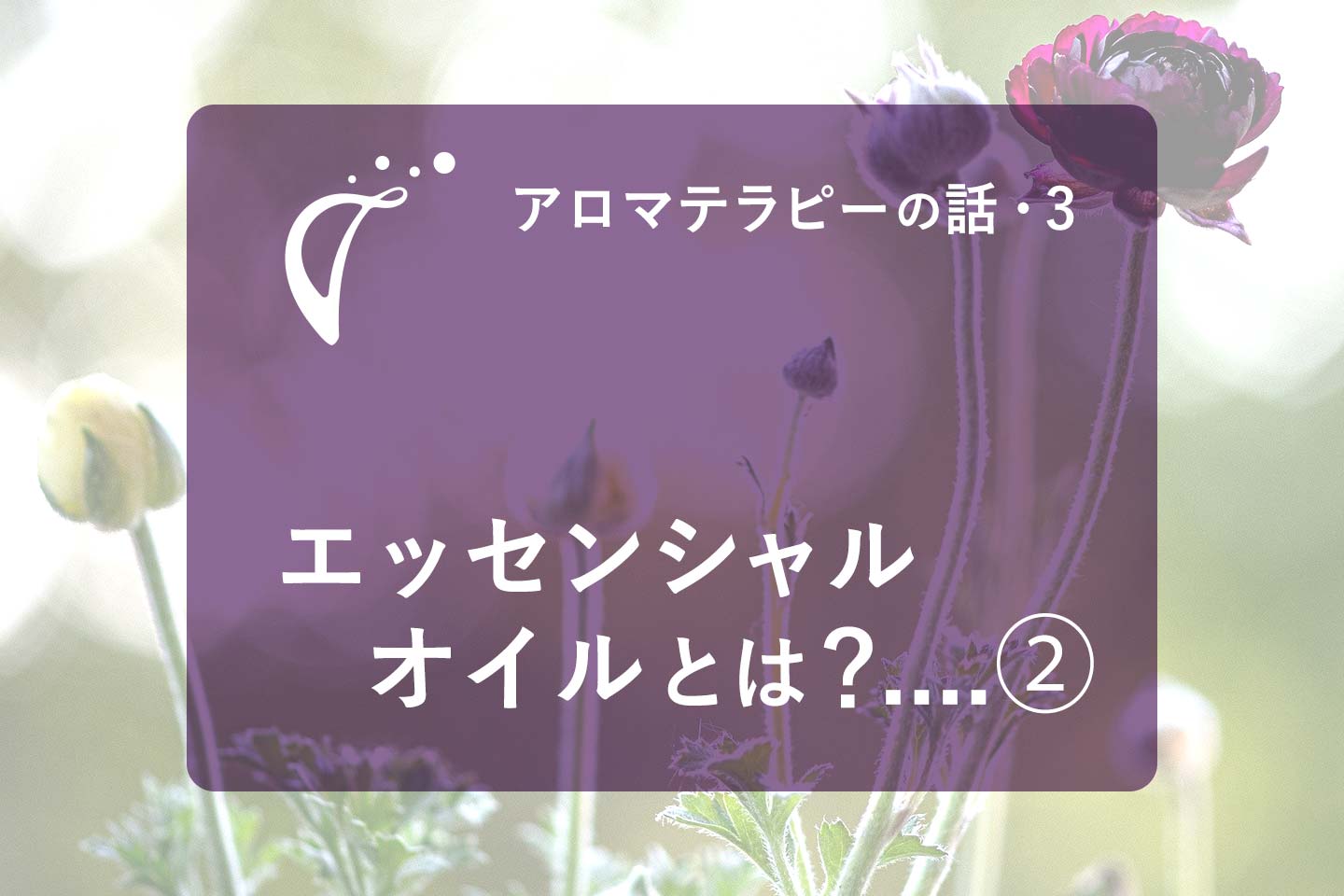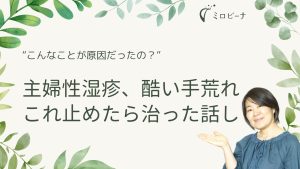Hello! My name is Kigawa, and I work for Bi Natural and Milobina.
Last time, what is aromatherapy really? So, I had a talk. Today is the continuation of that.
Well, it's rare to find modern skin care cosmetics that don't contain botanical ingredients. I think this means that the power and effects of plants are now being recognized more than ever before.
There are also many products that claim plant scents, such as ``citrus scent'' or ``rose scent.'' Looking at that, I think that people like natural scents...
But did you know that very few scents actually come from real plants?
In other words, it would actually be more accurate to write it as a "citrus-like scent" or "rose-like scent."
Today, I would like to help you deepen your understanding of aromatherapy and scents by giving examples that are easy to confuse.
Last time, we talked about how the scent components of essential oils used in aromatherapy have their own pharmacological effects.
On the other hand, synthetic scents have no effect on improving your skin or promoting health in your mind and body.
There are several reasons why fragrances are added to cosmetics, but one that is surprisingly little known is to hide the scent of the ingredients.
Whether they are natural or synthetic ingredients, there are some that do not have a good fragrance for use in cosmetics.
Flavoring agents are used to mask these ingredients.
However, in the case of essential oils, the essence of the scent itself has an effect on the human body and skin, so normally essential oils that are suitable for that purpose are blended.
However, in the case of products that are mass-produced, they often go through a process to make the scent uniform.
The scent and texture of essential oils and plant materials can vary considerably depending on the weather, production area, temperature and humidity during the manufacturing process, etc.
This is one of the benefits of nature, but if the scent is different than usual, users tend to think that there is a problem with the quality.
For example, maybe the smell has changed because it's an old product? I end up having doubts about it, or I don't want it to smell different from my usual pleasant scent, and I start thinking about all kinds of things.
When such complaints occur frequently, manufacturers have to incur costs to respond. If we try to respect nature's natural state, the more we make, the more complaints we receive and the costs go up.
Japanese people in particular have very sensitive sensibilities, so there are more people than in other countries who cannot tolerate even the slightest difference.
At Milobina, we have been selling natural products for a long time, but the number of inquiries and complaints has decreased considerably recently, but in the past we used to receive a lot of inquiries and complaints.
It was common for the scent to be different than usual, but there were other things as well.
"The color of the cream is different from usual, yellowish or whitish"
"It's harder and softer than when I bought it in the summer."
That was a lot. It's natural because it's a natural product, but if you're used to uniform products, you'll be surprised.
In particular, major Japanese cosmetics manufacturers are truly excellent!
Even if you make 10,000 pieces, you can make them all have the same color, texture, and scent. I say this simply, but it's really difficult.
In particular, the more natural ingredients you use, the more difficult it becomes.
By the way, there shouldn't be even a 1mm difference in the position of the label, but that's perfectly clear. This degree of precision is unique to Japanese products,
Honestly, I think that cosmetics are what make your skin so even, so I wonder if it's necessary to spend energy on that.
This is a little off-topic, but it is extremely difficult to create a uniform scent using only 100% natural ingredients, so artificial fragrances are often used as the fragrance ingredient.
If you do this, there will be no difference, so you can make it at the lowest cost.
The other type, as I mentioned earlier, is natural, but the scent ingredients have been adjusted.
For mass production, rather than blending individual essential oils as they are, fragrance-adjusting ingredients are often added to prepare the essential oils.
Essential oil itself contains at least 100 types of various scent components, and at most 300 types (Rose and Moon Peach are the most famous), but mainly the scent components that are characteristic of the essential oil's scent. By extracting and blending, we compensate for the imbalance in scent.
For example, the ingredient with a rose-like scent that makes you think, ``This is rose!'' is called geraniol.
Menthol is what makes you think, "Oh, this smells like peppermint, right?"
Lavender is lavandurol, and limonene gives off a citrus scent.
If these fragrance ingredients are extracted from plants, they are considered natural ingredients, so they can be said to be 100% natural.
However, in that case, the efficacy of the essential oil is likely to be considerably lower.
Earlier, I wrote that there are at least 100 types of scent components contained in essential oils used in aromatherapy.
In fact, it is not possible with current technology to analyze all 100 types. In addition, there are at least 100 types of fragrance ingredients that interact with each other, creating synergistic effects and, conversely, eliminating the toxicity of toxic ingredients.
It is said that it will be impossible to unravel the world at that cosmic level.
In other words, what I'm trying to say is that essential oils themselves are most effective when used in their unadulterated, pure state.
You can adjust the scent by adding just the typical ingredients, but you can't expect much additional effect, and it will only adjust the scent.
In my experience, products with controlled scents tend to have a weak scent, giving me the unpleasant feeling of being cheated. I think we probably feel that it is not automatically a natural object.
Recently, problems such as people developing allergic symptoms or suffering from the smell of fabric softener just by being next to someone wearing the scent of fabric softener have gradually come to the fore.
I think it's very good and important to pay attention to that.
I also really don't like fragrances in laundry.
Although it is called a fragrance, it is a completely artificial chemical substance.
This is a substance that has never existed in human history, and my DNA recognizes it as dangerous, so I feel like they are trying to keep me away from it.
Prolonged exposure to these artificial fragrances is more likely to cause allergies, and many people don't know that they can be dangerous.
The bad thing about artificial scents is the concentration of the scent.
Essential oil scents are volatile and do not last long. If you want to make it last longer, you can make the concentration really high...
However, as you can easily imagine, no matter how natural the scent of essential oils may be, if you are exposed to a very strong scent for a long time, you will be put off.
Scents have a huge impact on our pleasure and displeasure; strong scents make our brains tired and our bodies dislike them. Excessive exposure to strong scents, even natural essential oils, can be detrimental to your health, so I think you have to be careful about the scents you wear.
Essential oils also have pharmacological effects that affect physiological functions, so as the saying goes, too much is better, and overuse can have the opposite effect.
This is a bit of a detour, but the fact that the scent of laundry detergent and fabric softener lasts for days is actually because they contain a large amount of fragrance.
This is actually very scary.
Not only do overly strong scents induce headaches and nausea, and continue to overstimulate the brain, but large amounts of chemicals are constantly floating around us.
It was not only bad for others, but also for my body.
Let me repeat: Artificial fragrances = artificial chemical ingredients.
Artificial fragrances are not 100% safe, and there is a risk of causing allergies if you continue to use them, so although they are very convenient, you must be careful when using them.
Fragrance Etiquette: Now that there are so many artificial fragrances out there, I think you need to be extremely careful if your favorite scent is an artificial fragrance.
Finally, do you know how many fragrance ingredients are contained in chemical products that claim to have a ``citrus scent'' or ``rose scent''?
Rose essential oil contains about 300 types of natural scent components, but artificial rose scents are said to have a relatively large number of scent components, but still only about 6 kinds!
Now, it's only natural that when you smell a synthetic scent compared to an essential oil, you feel uncomfortable and think, ``Is this weird?''
Now I say that I don't like artificial fragrances, but for some reason this has become the case since I started using aromatherapy. When I was a kid, I loved the smell of strawberries and all sorts of things (lol)
Your body may have realized that the previous scents were dangerous as you became more familiar with natural scents.
I hope that all of you who read this will be careful to experience natural scents as much as possible from now on.
I would like you to take this opportunity to replace the use of fabric softener and laundry detergent, which remain all day long.
Oops, I just got so hot that it took so long. Next time, I would like to talk about aromatherapy.
Thank you for reading to the end today!
see you.







